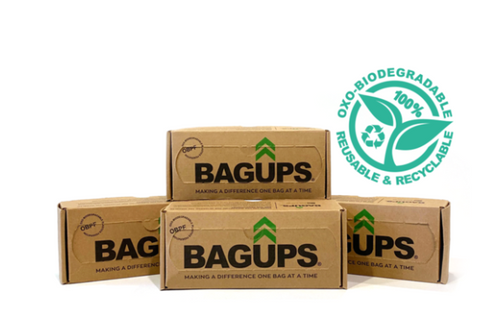The Case Against Plastic
Why Do People Still Like Regular Plastic Bags?
One of the craziest ironies in this sustainable world of ours is the continued use of regular plastic bags instead of biodegradable plastic bags.
It's amazing how much non-biodegradable material is used for garbage bags, straws, cup lids, bottles, and bubble wrap.
This stuff really clogs up landfills, not to mention the ocean.
According to National Geographic research there are 5.25 trillion pieces of plastic in the ocean.
That kind of waste can profoundly affect aqua marine life. It's also just plain nasty.
For instances, a turtle can suffocate if it gets entangled in a plastic bag or a whale can starve if he eats the stuff and has no way to get rid of it.
Here's an infographic on how bad the problem is.

Please share this with everyone you know!
Recycling Plastic Is Not Easy
Many people think if they throw plastic away to be recycled, they don’t have to worry.
However, not all plastic can be recycled – only bottles can be easily repurposed.
All other plastic materials are not usually sent for recycling.
When you consider that 500 million straws are sold each day or the bubble wrap produced per year could circle the globe . . . not 1, but 6 times, it puts everything into perspective.
Plus, all the coffee we drink in cups with plastic lids can cause major landfill problems, as 16 billion of those lids are used annually.

The problem even gets worse when we use plastic for bags, as we use approximately one trillion plastic bags per year.
One TRILLION!
1,000,000,000,000.
That translates to 2 million bags per minute.
And as of today, only a tiny fraction of these are biodegradable.
This really makes the idea of biodegradable plastic bags very appealing.
Changing Our Habits Regarding Plastic Bags
Even when people try to kick the habit of plastic, they tend to fall back into the trap again.
For example, one store that sold eco-friendly garbage bags noted that its customers asked for plastic to tote the bags home.
That’s when you stop to reason that people are much too addicted to using plastic.
Moreover, scientists state that it takes from 450 to 1,000 years for traditional, petroleum-based plastic to decompose.
1,000 years!

Decomposition Takes Less Time
Compare that with biodegradable bags, which take 12 to 36 months to fully break down.
In addition, some bio-degradable garbage bags are made with an agent that causes the bags to decompose faster.
Consider this too – Most synthetic plastics are made with crude oil, which is not safe for the environment.
Also, during the processing of fuel-based plastics, additives, such as BPA, may be used to make the material more stretchy or pliable.
Therefore, using a biodegradable bag – one that is made with more sustainable substances, creates less problems with ongoing waste.
Like BagUps.

Plastic Recycling
Because plastic bottles are usually recycled, they can avoid the landfills, provided a user separates his or her bottles from the regular trash.
When plastic is recycled, it goes through several processing steps, as follows:
- It is sorted by polymer type
- It is shredded
- It is washed
- It is melted
- It is pelletized, or turned into pellets
- It is made into new items
When the plastic is sorted, it is done so all the contaminants are removed.
Once the plastic has been sorted and cleaned it will either be shredded into flakes or melt-processed to form plastic pellets, either of which can be used to make new items, including more bottles.
Always Use Biodegradable Bags
While it is good to know we can recycle the material, it still does not mean it will not end up in the landfill.
If you recycle anything, make sure you don’t throw away those plastic bottles.
As for plastic bags, statistics show that only 1% to 3% of bags are recycled.
All the other bags are pitched in landfills, or end up polluting the deep blue sea.
Therefore, when it comes to bags, use the biodegradable type – bags that take much less time to biodegrade.
Well Worth the Investment
When bags are made of a biodegradable material, it may cost more to make them.
However, it is well worth the investment.
When you consider the clean-up costs associated with traditional plastic and its effect on the environment, you will discover that choosing biodegradable bags over traditional plastic bags is smarter.

Also, consider this – Less energy is consumed when making biodegradable plastic bags compared to ordinary plastic bags.
For example, when a polymer is corn-based, the manufacturer uses 65% less energy than when a polymer is made from a petroleum.
Moreover, the making of any bioplastic does not use hydrocarbons, all which means fewer fossil fuels are used and pollution is reduced.
In turn, about 68% fewer greenhouse gases are emitted into the air.
Zero Percent Waste
Where you have a significant benefit is in the breakdown of biodegradable plastic – something that takes a very small amount of time when compared to traditional plastic.
Also, as soon as it breaks down, the plastic is gone, which means 0% waste. Compare that with traditional plastic, which makes up approximately 13% of the current stream of waste produced, or 32 million tons of trash per year.
Only 9% of this type of fuel-based plastic can be recycled, which, indeed, creates quite a dilemma.
When you use a biodegradable plastic, you are making significant inroads in keeping the planet cleaner and safe.
If you get too used to using regular plastic, you end up becoming part of the problem, not the solution.
Given our addiction to plastic, it’s time to start participating in an environmental rehab program – one where we use biodegradable bags instead of traditional plastic.
By using biodegradable bags to conquer our plastic addiction, we can realize our goal of a sustainably cleaner planet and a higher quality of life.
++++++++++++++++++++++++++++++++++++
Have questions about how you can help save the planet?
Contact us at BagUps.
Want to join the thousands of others committed to a cleaner tomorrow?
Get a BagUps subscription today.
++++++++++++++++++++++++++++++++++++
Additional Information About Saving The Planet
Living An Eco Friendly Lifestyle
My Favorite Kitchen Product Is Bagups
How Can I Be Even More Eco Friendly
15 Ways We Can Help Save The Planet
Bagups Mentioned In Redfin Blog
